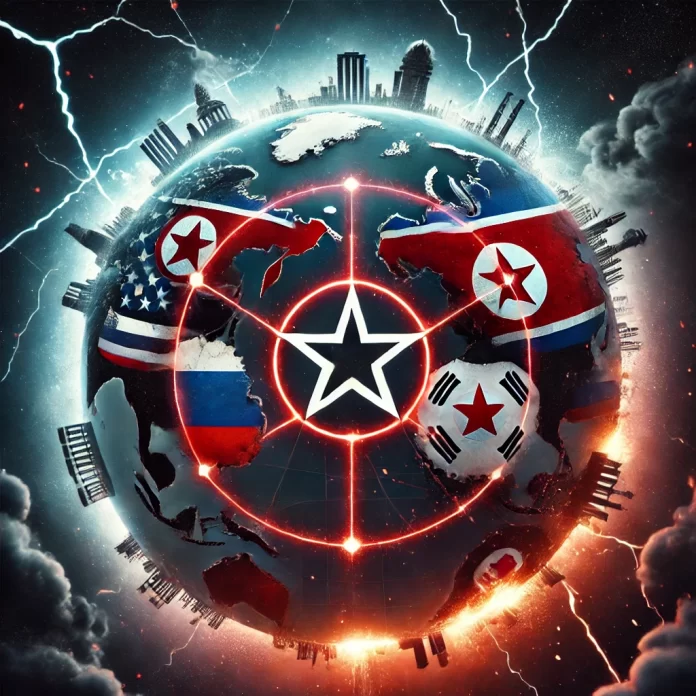The war between Russia and Ukraine has taken a dark turn with the involvement of North Korea, forming an alliance that could change the course of global power.
The New Axis of Evil: Russia and North Korea
This new coalition of authoritarian regimes—Russia, North Korea, and other potentially sympathetic nations—has been described by some as the “Axis of Evil,” a group threatening the established international order that has maintained peace since the end of World War II.
North Korea’s decision to send troops to fight for Russia on Ukrainian soil is a significant shift in the conflict. It reflects not only the desperate situation Russia faces, having suffered significant casualties, but also North Korea’s desire to secure both military and financial support. The two nations have joined forces in an attempt to rewrite the global balance of power in their favor, challenging democratic nations and their alliances. Together, Russia and North Korea have mobilized tens of thousands of troops to intensify the battle in the Kursk Oblast, an area vital to Russia’s offensive.
This partnership exposes a clear strategic alignment between the two authoritarian regimes. Russia, struggling with manpower shortages and massive losses on the battlefield, has turned to North Korea for help. Meanwhile, North Korea stands to gain by acquiring advanced military technology from Russia, particularly related to nuclear and missile capabilities. These moves make North Korea even more of a threat to the United States and its allies, escalating tensions in East Asia as well as Europe.
The Growing Threat of Authoritarian Alliances
The alliance between Russia and North Korea signals a larger shift in global geopolitics, as authoritarian regimes increasingly form strategic partnerships. This growing “Axis of Evil” has emboldened powers like China, which also seeks to challenge the dominance of Western nations. The cooperation between these nations is not merely about regional conflicts; it is about reshaping the international system to favor authoritarian control over democratic freedoms.
Defiance Amidst Discord: The Axis of Resistance and the Israel-Iran Conflict
North Korea, already known for its nuclear ambitions, has found in Russia a willing partner eager to support its expansionist goals. In exchange, Russia receives the much-needed reinforcements for its faltering military campaign in Ukraine, where over 600,000 Russian soldiers have been either killed or wounded. North Korea’s involvement does more than bolster Russia’s forces; it also signals that the international community must confront a new axis of power—one that seeks to undermine the established world order.
This partnership allows both nations to challenge the West’s influence by weakening its military and economic resources. North Korea, with its vast manpower, and Russia, with its vast financial resources from oil and gas revenues, create a formidable alliance. They view their combined strength as a way to not only defeat Ukraine but to slowly erode the influence of Western democracies across the globe.
Espionage Crisis Unveils Cracks in Iran’s Axis of Resistance
Western Weakness: Enabling the Axis of Evil
Despite the growing threat posed by this axis of authoritarian powers, the West’s response remains hesitant and fragmented. The Biden administration’s policies, which include lifting some restrictions on Ukrainian military operations, come too late and remain too limited. Only after years of hesitation did the U.S. allow Ukraine to use long-range missiles in Russian territory, and even then, the approval only applied to a specific region, Kursk. This delay in action has provided Russia and North Korea the time to solidify their alliance and escalate the conflict.
The West’s passive stance is further highlighted by Germany’s diplomatic efforts with Russia. Chancellor Olaf Scholz’s phone call to Vladimir Putin, intended to push for negotiations, instead gave Russia a symbolic victory. This act is seen by many as weakening the position of the West and, ultimately, empowering authoritarian regimes. The muted response to North Korea’s involvement in the war also reflects this growing defeatist attitude among some Western leaders.
US Sanctions Gazprombank to Limit Russia’s War Funding
If the West continues its trend of weak and delayed responses, it risks allowing the “Axis of Evil” to gain momentum. Authoritarian regimes like Russia and North Korea are not just fighting for control over specific territories; they are fighting to reshape the international order itself, undermining the values of democracy and human rights. A lack of decisive support for Ukraine could give these regimes the upper hand, enabling them to carve out spheres of influence at the expense of democratic nations.
Consequences for Global Peace and Stability
The alliance between Russia and North Korea signals a shift in the global order, where the balance of power is increasingly tilted in favor of authoritarian regimes. The growing “Axis of Evil” is already challenging the principles that have upheld global peace since the end of World War II. By joining forces, these nations are destabilizing both Europe and East Asia, threatening not only the sovereignty of Ukraine but also the broader international system.
Russia’s ability to continue its war despite suffering heavy losses is largely due to its vast financial resources, derived from oil and gas exports. Meanwhile, North Korea’s involvement in the war has elevated its military ambitions, with Russia expected to provide technology and resources to further North Korea’s nuclear and missile programs. This dangerous collaboration raises the stakes for global security and highlights the risk of allowing authoritarian regimes to gain strength unchecked.
Ukraine’s fight is not only about defending its own land; it has become a frontline defense for the Western world. The growing Axis of Evil, however, threatens to overshadow these efforts. If Western nations fail to act decisively, the result could be far-reaching consequences not only for Ukraine but for global stability as a whole. The erosion of the international order, long held in place by democratic values, could lead to a world where authoritarian powers, like Russia and North Korea, hold sway over global affairs.


